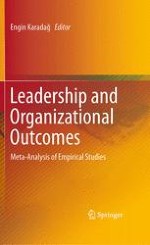2015 | OriginalPaper | Chapter
The Effect of Leadership on Organizational Trust
Authors : Fatma Uslu, Erdem Oklay
Published in: Leadership and Organizational Outcomes
Publisher: Springer International Publishing
Activate our intelligent search to find suitable subject content or patents.
Select sections of text to find matching patents with Artificial Intelligence. powered by
Select sections of text to find additional relevant content using AI-assisted search. powered by
